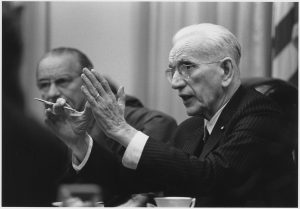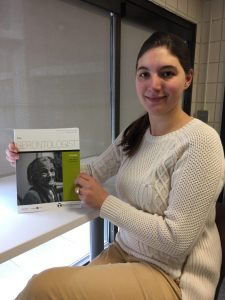November 27, 2017
by McCormack Speaks
0 comments
by William Flagg, McCormack Graduate School student
 Why have some of our goods become so disposable and so cheap? A bit of research on this would undoubtedly take us beyond the websites of the retail chains that provide our cheap and disposable dressers, nightstands, and bookshelves, and connect us to a wealth of literature on a topic that is a bit heavier than retail — deforestation. We might learn that some products at retail chain stores that we depend on for our cheap furniture in the developed world were driving vast amounts of deforestation in places like Brazil, Indonesia, and the Democratic Republic of Congo. We would also learn that some other consumer items that have become a part of our everyday lives—like vegetable oils, soy, and beef– have similar impacts on forests. Of course, this is something we do not think about when stepping into our local big box store to buy that cheap dresser or discounted entertainment center. But the impact of millions of people making these same purchases over time has certainly been felt in the forests that harbor the basic components of these materials. These are only a couple of examples of the impacts of demand for consumer commodities in the global North that drive deforestation in the global South.
Why have some of our goods become so disposable and so cheap? A bit of research on this would undoubtedly take us beyond the websites of the retail chains that provide our cheap and disposable dressers, nightstands, and bookshelves, and connect us to a wealth of literature on a topic that is a bit heavier than retail — deforestation. We might learn that some products at retail chain stores that we depend on for our cheap furniture in the developed world were driving vast amounts of deforestation in places like Brazil, Indonesia, and the Democratic Republic of Congo. We would also learn that some other consumer items that have become a part of our everyday lives—like vegetable oils, soy, and beef– have similar impacts on forests. Of course, this is something we do not think about when stepping into our local big box store to buy that cheap dresser or discounted entertainment center. But the impact of millions of people making these same purchases over time has certainly been felt in the forests that harbor the basic components of these materials. These are only a couple of examples of the impacts of demand for consumer commodities in the global North that drive deforestation in the global South.
According to the World Wildlife Fund, “some 46-58 thousand square miles of forest are lost each year– equivalent to 48 football fields every minute.” [1] Much of this deforestation takes place in tropical rainforests in Latin America, Africa, and Asia. Ahost of products in stores in the developed world have their origins in tropical rainforests, threatening these forested areas, and the rich variety of plant and animal species living in them. These forests are too important to lose, and provide a plethora of life- sustaining benefits to humans. According to the Rainforest Alliance, rainforests help stabilize global climate patterns; act as a natural filter for bodies of water that run through them, like the Amazon River; provide habitat for 80% of the world’s terrestrial biodiversity; are home to 25% of all modern medicines (and make up 70% of medicines that cure cancer!); and, play a huge role in the fight against climate change, as forests suck up vast amount of carbon dioxide from our atmosphere and store them [2]. Furthermore, regarding this latter point, forests add to climate change when they are cut down. It is estimated that deforestation is currently responsible for 20% of global carbon emissions. Put simply, deforestation remains one of the most important crises of our time, with a host of direct implications in the fight against climate change, biodiversity loss, and social and economic justice. What is less clear, however, is what continues to drive deforestation worldwide, and how do we stop it?
This problem might seem too big for any one of us to shape — and, in many ways it is. But that does not mean that our personal choices cannot have a positive impact. Every time we step into a store to buy groceries, furniture, coffee, and a whole host of other everyday items, we are connected to long and convoluted supply chains of materials harvested or mined from somewhere else; processed somewhere else; manufactured somewhere else; and, shipped from somewhere else. In many cases, these aforementioned steps all take place in different locations. In short, our purchases have a direct impact on the environment, and the people who live in those environments, in many places across the globe.
So the next time we make our way out to the grocery store, consider using our purchasing power to buy items not connected to deforestation in the developing world. One easy way to do this is to look for labels on products that certify that the product was sourced in a sustainable way. For example, for palm oil (which might be found in as much as half of all supermarket products!)[3], look for the patented Roundtable on Sustainable Palm Oil (RSPO) label pictured below. Another example is the Rainforest Alliance seal which certifies that products have been grown and harvested in an environmentally and socially conscious way.  Of course, it’s important to remember that by simply buying products that are certified sustainable we are not going to eradicate deforestation– this issue is too large and complex to be tackled by consumerism. But, our purchasing decisions do have consequential impacts on the world’s forests, and buying sustainable products is one way we can contribute to a healthier planet.
Of course, it’s important to remember that by simply buying products that are certified sustainable we are not going to eradicate deforestation– this issue is too large and complex to be tackled by consumerism. But, our purchasing decisions do have consequential impacts on the world’s forests, and buying sustainable products is one way we can contribute to a healthier planet.
[1] Rainforest Alliance. “9 Rainforest Facts Everyone Should Know.”
[2] World Wildlife Fund. “Overview.”
[3] Rainforest Rescue. “Palm oil– deforestation for everyday products.”
William Flagg, studies international relations at UMass Boston’s McCormack Graduate School.






